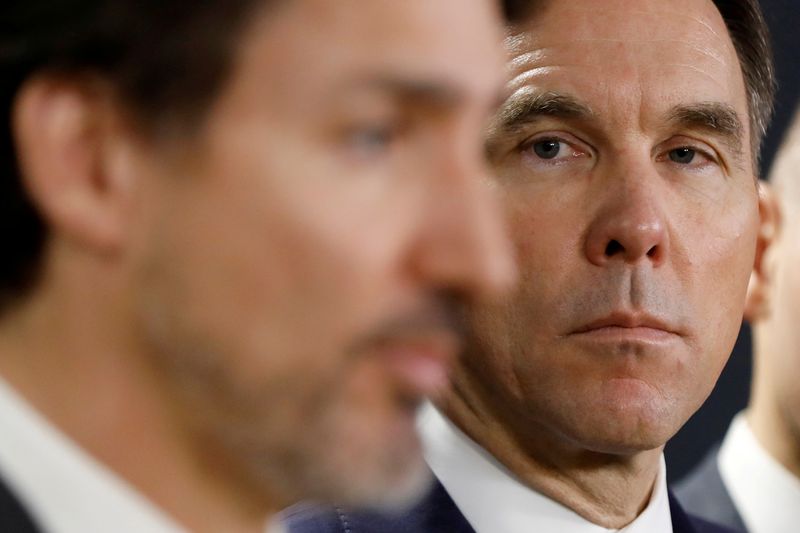By David Ljunggren, Julie Gordon and Fergal Smith
OTTAWA/TORONTO (Reuters) - Canadian Finance Minister Bill Morneau's clash with Prime Minister Justin Trudeau over ballooning deficits reflects sentiment among business leaders that Ottawa has little apparent interest in the economy, say four sources with direct knowledge of the community's unhappiness.
Morneau and Trudeau were scheduled to meet on Monday in a bid to work out their differences. Sources said they disagreed both over the huge amounts Ottawa is spending to combat the coronavirus and also a push by ministers close to Trudeau to consider multi-billion dollar green initiatives.
Trudeau came to power in late 2015 with a team of young activist advisors who favored deficit spending on a range of social programs. Large corporations used to close ties with Ottawa started to complain they were being overlooked.
"It's entirely true to say that business largely feels it's not important to this government," said a well-placed source who has complained to Ottawa.
The person, who requested anonymity given the sensitivity of the situation, said Trudeau and key ministers should be meeting publicly with senior industry figures to reassure Canadians that Ottawa understood the sector's concerns.
The offices of Trudeau and Morneau did not respond to requests for comment.
Business and analysts have fretted about Ottawa becoming distracted by the discord as it tackles the coronavirus crisis.
Signs of strain between the Liberals and the business community have been evident for some time. Even before the pandemic, one member of the Liberals' elite fund-raising Laurier Club said they had stopped donating money and refused to arrange events for the party.
Don Drummond, an economist and former finance official, noted that Ottawa had stumbled with its initial offer of a 10% wage subsidy for firms.
"I don't think they had any idea (about) what businesses were suffering. And why would they, that's not the world they come from," he said. After complaints, Morneau quickly raised the subsidy to 75%.
Canada's budget deficit is forecast to hit C$343.2 billion ($253.4 billion), the largest shortfall since World War Two, this fiscal year. Total coronavirus support is nearly 14% of gross domestic product.
Morneau sympathizers portray him as the one person inside government trying to maintain control over the taps.
"The spending has gone too far - it's almost as though they have a short-term political approach of saying 'Who hasn't got money? We'll give it to them' as opposed to looking at the economy in a structural way," said one well-placed Liberal.
But Dan Kelly, chief executive of the Canadian Federation of Independent Business, complained that Morneau himself appeared to have no interest in meeting his members.
"Government usually is better if it listens ...it always comes across that he (Morneau) and his government know better than anyone else," he said in an interview.
Norman Levine, managing director at Portfolio Management Corporation, said that now is not the right time for new government green initiatives.

"It doesn't have the money and its borrowing levels are already quite stretched due to COVID-19 and previous borrowings," he said by email.